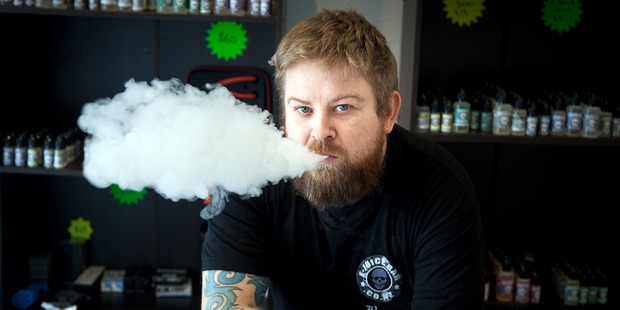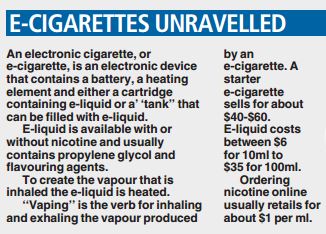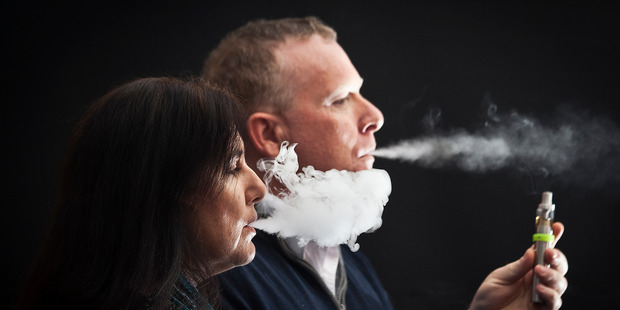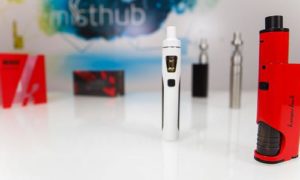Of the 50,000 Kiwis who try to quit smoking every year, only about 10,000 are successful. Allison Hess talks with a Bay man who stubbed out the smokes and switched to e-cigarettes, and owners of a local vaping store.

Inside one of Tauranga's newest specialist e-cigarette stores, the owner will gladly show off a $40 e-cigarette starter kit, the gleaming metal cylinders arranged beneath a glass counter in ascending price and quality.
Behind the counter, vials of e-liquid neatly line the shelves and a stack of menus detail designer e-liquid flavours, from Mouth Funk Crunch (warm berry crunch dessert service up with a creamy vanilla ice-cream) to Unicorn Dust (creamy strawberry iced vanilla cupcake).
This is where Tauranga man Jamie Hatwell, a smoker-turned-vaper, does his e-cigarette shopping.

Hatwell sucked roll-your-owns for more than a decade, the draw of smokes pulling him in when he was just 15 years old.
"I was 16 when I started going out buying packs of smokes and ever since then I always had a pack on me."
The level of Hatwell's addiction meant every half hour he had to go outside for a smoke, going through 50g of tobacco a week.
"I used to cough up bloody phlegm. At the start it wasn't as expensive. But over the years, especially coming up on the last three years before I quit is when it really started hitting the pocket," he says.
Hatwell's story of trying to quit is similar to the 50,000 other Kiwis who try to quit smoking every year - only about 10,000 are successful. The gum and patches never worked and he lasted a couple of days or a week at most going cold turkey before reaching for the smokes again.
"My family and I were getting sick of it. I knew it was bad for me."
Continued below.
Things changed when his friend introduced him to e-cigarettes a year-and-a-half ago.
"Once I started using e-cigarettes I stopped smoking cigarettes within a month. Once I got a bigger-wattage e-cigarette I stopped smoking completely.
"I've been sweet since."
Vaping did something for Hatwell that gum or patches never could: it addressed the social side of smoking.
Once I started using e-cigarettes I stopped smoking cigarettes within a month. Once I got a bigger-wattage e-cigarette I stopped smoking completely.
"Smoking is addictive but it's also something to do with your hands. Vaping is still doing that, you've got something in your hand, you're doing something."
VAPING STEAMS UP IN THE BAY
Only 10 years ago e-cigarettes entered the New Zealand market but since then they have commanded a devoted following of ex-smokers, who rely on vaping to get their nicotine hit and avoid tobacco smoke.
E-Juice Bar is one of two specialist e-cigarette retail shops to pop up in Tauranga in recent months due to demand for e-cigarette products.
The small shop, in Gate Pa, was opened two months ago by owner Ben Kitson.
A smoker for 10 years, Kitson started importing e-cigarettes for himself and adding his own doses of nicotine, slowly weaning himself to a point where he now uses none or a minimum amount.
Kitson says he shares his own experience of e-cigarettes to curious customers.
"I have no proof it's better for you other than what it's done for me and my customers. It's benefited me and people keep coming back," Kitson said.
"I'm not allowed to market it as a health sensation, the Ministry of Health doesn't allow that. I tell people my experience and that's as far as it can go."
With a packet of cigarettes expected to increase by 10 per cent every year for the next four years, much cheaper e-cigarettes are an appealing alternative.
"It's definitely cheaper than buying cigarettes. The starter kit range is $40-60. That gets you the whole set-up, the tank, the battery that is built in and the USB charger."
From there, e-liquids cost about $13 for 30ml, which would last about a week, and nicotine ordered online retails for about $1/ml, with the recommended dosage between 8ml and 12ml. Up-keep of the device includes buying new coils, which cost $20 for a 5 pack which would last a month or two.
I have no proof it's better for you other than what it's done for me and my customers. It's benefited me and people keep coming back
All up, vaping costs about $20-25 a week, once the e-cigarette had already been purchased. That number would just keep going down as the vaper weaned themselves off nicotine.
Read more: Cyberbullying law nabs 38 bullies
Kitson criticised the Ministry of Health for not being pro-active with the e-cigarette industry, saying people importing nicotine online and mixing it themselves with e-liquid was "not a good way to do it."
"With people adding their own nicotine, it can be poisonous, at the high strength people have to add it from." The ideal way would be to allow retailers to sell nicotine e-liquids so they could help and show people how best to do it, he said.

Meanwhile, in Papamoa, another e-cigarette specialist store occupies a second-storey space above a bakery.
Rob and Lia Hasket opened their e-cigarette retail store, Naked Vapour Shop, just before Easter, after demand began spilling over from their online sales.
The pair have been trading online since 2011 but demand forced them to open what was "pretty much a vaping superstore".
"We have 2000 unique products here," Rob says and "it was great to be able to help people over the counter as e-cigarettes can be confusing for first-timers.
"They get a bit lost online because there's a lot of information - and misinformation - out there."
Rob says the store is hands-on, setting customers up with e-cigarettes, giving advice and tips on how to use them safely.
He is careful not to pitch e-cigarettes as therapeutic.
"They are not quit-smoking devices - they are alternatives. People quit smoking by default, typically."
He got into the vaping business when he made the switch to e-cigarettes himself.
After trying an e-cigarette he went smoke-free for two days for the first time in his adult life - he was sleeping better and got his taste buds back.
"At the time, devices available weren't very good, so I saw a bit of a niche."
Rob says the success rate of his customers stopping smoking was "extraordinary" based on repeat sales.
Most of the ingredients in the liquid have been recognised as safe for food use. It's when you vaporise the liquid off that they don't quite know what may be going on. But compared to smoking cigarettes? Not even close.
When people switch to e-cigarettes, they start out with cigarette-type flavours but after a while, once their taste buds recover from the damage of smoking, they turned to the more "yummy" flavours, he says.
"We have about three dozen flavours. Anything from tobacco-type flavours through to lollie flavours, dessert flavours, drinks, all sorts."
As to the health effects of vaping, Rob says they are not anywhere near as bad as traditional tobacco cigarettes.
Read more: LGBTQ march in Tauranga to honour Orlando victims
"There's nothing combusted, nothing is burnt.
"Most of the ingredients in the liquid have been recognised as safe for food use. It's when you vaporise the liquid off that they don't quite know what may be going on. But compared to smoking cigarettes? Not even close."
An online message board Rob has set up, called Kiwi Vapers, is packed with testimonials from nearly 1000 members who puffed on tobacco cigarettes for decades before quitting with the help of e-cigarettes.
One member wrote "one month, no tobacco rollies after 45 years [of smoking]".
Another got into vaping after 35 years of smoking and had her first "full ciggie-free week" wondering how she ever used to enjoy smoking cigarettes in the first place.
THE JURY IS OUT
Despite success stories and increasing popularity the scientific haze around e-cigarettes causes a quandry. On the one hand, e-cigarettes could be the game-changer in New Zealand's struggle to become smoke-free by 2025. On the other hand, they introduce an untested, addictive, potentially dangerous - and rather tasty - product.
Bay of Plenty District Health Board medical cluster nurse leader Sandra Fielding says there has not yet been reliable research into the effectiveness of e-cigarettes as a safe way to quit smoking.
"Until this is published and reviewed and until there is clearer product control in place, the long-term health effects either positive or negative remain unclear."
She acknowledges some people have benefited from the use of e-cigarettes, using them to reduce or curb nicotine addiction and they play a part in the habitual aspects of smoking, like social events where tobacco is being used, that gum or patches could not address.
"However, until there is clear evidence of benefits versus risks, along with longer-term outcomes, there is the requirement for a cautious approach. Smoking (the habitual use of cigarettes) and tobacco addiction are complexly linked and most smokers require more than just nicotine replacement therapy to support the lifestyle changes involved in quitting tobacco for good," Fielding says.
The Ministry of Health is also waiting for stronger evidence as to the benefits of e-cigarettes, citing a 2014 Cochrane review of existing studies, which found that the quality of the evidence is low and based on only two studies.
Meanwhile, people wanting to quit smoking should continue to use approved medications and get advice and support through a smoking cessation service such as Quitline.
A 2014 World Health Organisation report on issues and risks associated with e-cigarettes found there was currently insufficient evidence to conclude that e-cigarettes help users quit smoking or not.
The WHO document revealed while e-cigarettes were likely to be less toxic than conventional cigarettes, they pose a threat to adolescents and pregnant mothers.
The Ministry's Tobacco Programme manager Jane Chambers said the Ministry would continue to monitor research and reports on e-cigarettes.
"Meanwhile, people wanting to quit smoking should continue to use approved medications and get advice and support through a smoking cessation service such as Quitline," Chambers says.
Click here to view original web page at www.nzherald.co.nz






















